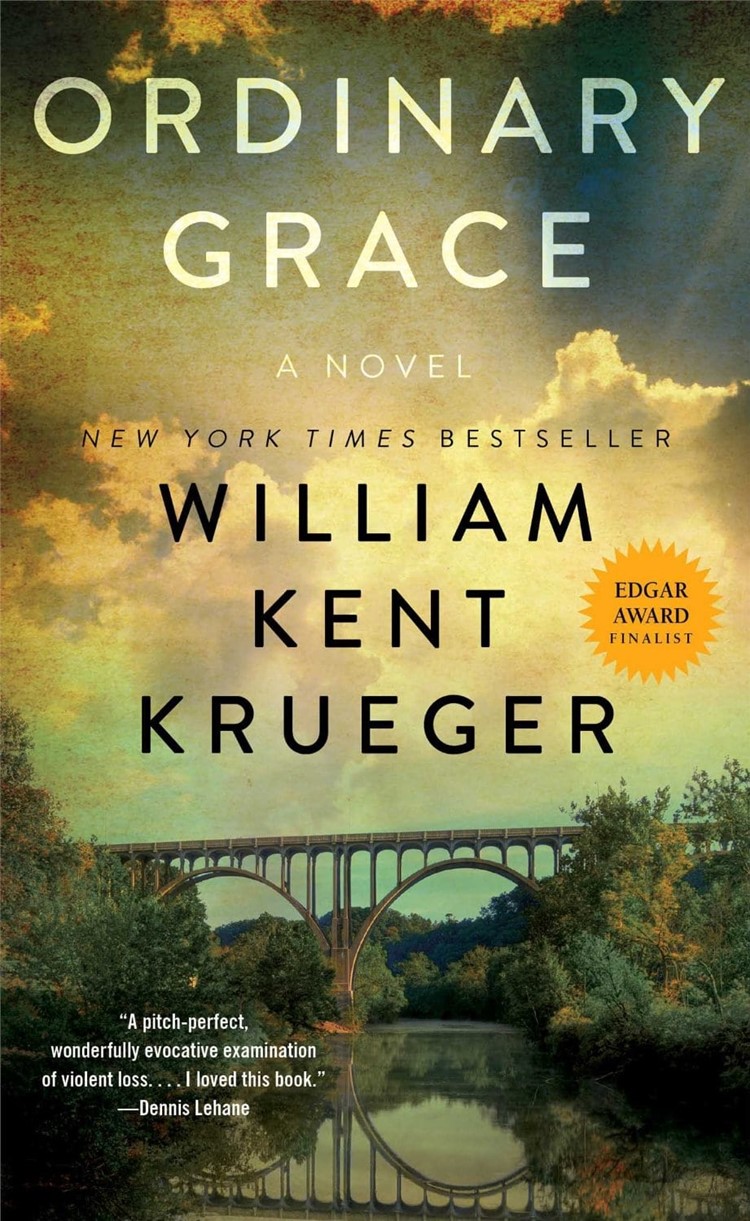
I am so honored to be featuring another amazing writer today in our Sundays With Writers series. Today I am interviewing William Kent Krueger after finishing his beautiful book ORDINARY GRACE and discovering that this book was anything BUT ordinary. If you are looking for a fast-paced roller coaster ride of a book, this isn’t it. This is slow-telling writing and a genuine crafting of a story sat its finest. It is the kind of book that you could hand to anyone and they would see small glimpses of their own childhood in it.
William Kent Krueger is new to me, but not new to mystery lovers. He writes a series called the Cork O’Connor mysteries that I am now looking forward to checking out. ORDINARY GRACE is his second stand-alone novel (the other being THE DEVIL’S BED) and has received rave reviews, awards, and accolades. In fact, ORDINARY GRACE has won the Edgar Award for Best Novel, Midwest Booksellers Choice Award for Best Fiction, Dilys Award, Independent Mystery Booksellers Association, Left Coast Crime “Squid” Award for Best Mystery Set Within the US, Barry Award for Best Novel, Anthony Award for Best Novel, Macavity Award for Best Novel…You know, just to name a FEW! AMAZING!
 ORDINARY GRACE is a beautiful coming-of-age story surrounding a small town and a series of murders that happen there. I can admit that while I was able to figure out the killer early on in the story, it did not take away from the beautiful writing that filled the pages. I really enjoyed the book and the author’s carefully crafted characters that made this story read more like a memoir than a piece of fiction.
ORDINARY GRACE is a beautiful coming-of-age story surrounding a small town and a series of murders that happen there. I can admit that while I was able to figure out the killer early on in the story, it did not take away from the beautiful writing that filled the pages. I really enjoyed the book and the author’s carefully crafted characters that made this story read more like a memoir than a piece of fiction.
After finishing the book, I emailed Kent and asked if he could join us today and share a little bit about why he created this stand-alone book, who inspired it, and if the pressure of putting such a beautiful book out in the world (and receiving every dang award) build upon his pressure of being a writer.
Grab your coffee and let’s chat with Kent today about his amazing book!

You are quite famous for your Cork O’Connor mystery novels, which I am so excited to explore now. ORDINARY GRACE stands on its own, although it has an element of mystery to it like your other books. What compelled you to develop this novel for your readers?
When you delve into the Cork O’Connor series, you’ll find that many of the stories have an undercurrent that involves the spiritual journey. This is something that comes naturally out of who Cork O’Connor is, a man of mixed heritage, part Irish-American and part Native American (Ojibwe). He comes from two different spiritual traditions and in the stories he’s often trying to find his own spiritual way. I’ve always seen Ordinary Grace as an opportunity for me to explore more deeply the question of the spiritual journey in ordinary lives.
Also, I’d wanted for a very long time to write a story that would allow me to return to an important period in my own life—the summer I was thirteen. For many reasons, I’ve remembered that summer vividly across these many decades. I wanted to recall that time and the kind of place I was living and the concerns that I had and put them on the page in a way that might help readers born years later to understand what it was like to be thirteen years old in a small Midwestern town in the summer of 1961.
And finally, I wanted to write a story that, although there would be a mystery at its heart, would be stylistically and structurally different from anything I’d written for the Cork O’Connor series. I simply wanted to stretch as a writer.
Told through the 13 year old eyes of your narrator, Frank Drum, this book reads like a beautiful memoir of adolescence. Did you channel a lot of your own boyhood stories in this book? What is one element of Frank’s life, in particular, that readers might be surprised to know comes right from your very own childhood?
I didn’t necessarily relate real occurrences, but rather a real backdrop that came from my childhood. Although based on several real towns in Minnesota, New Bremen is a reflection of the Midwest landscape of my adolescence. The quarry the kids swim in, I swam in. The excitement about the Fourth of July fireworks was my excitement. I lived in a house very similar to the Drum house and played on the banks of rivers very much like the Minnesota River.
What readers might find interesting is this: The Drum family is, in fact, based on my own family. My father wasn’t a small town Methodist minister, but he was a high school English teacher in a small town, a position elevated in the eyes of many. My mother, like Ruth Drum, was a frustrated artist. And I had siblings I loved dearly. A lot of the adjunct characters came out of my life, men or women I’d known along the way. So very much of the story was from my own experience. But thankfully I never suffered the kind of loss the Drum family suffers.
I am going to quote you from another interview where you said that the “seed of the kind of book I wanted to write,” was in your mind for 5 years. What would you say to someone who is harboring those kinds of seeds for a book and what pushed you to finally create it? Was writing it harder for you than the writing your Cork O’Connor mysteries or easier?
I think I wrote the novel when I was finally ready to write it, when I finally understood enough about storytelling to do the story justice. I didn’t have all the details in place when I launched into the work, but I had a good sense of the Drum family and of New Bremen. Much of the story itself I discovered along the way. Which is very different from the manner in which I’ve always approached the Cork O’Connor stories. Because the books in my series are, generally speaking, true mysteries, I’ve almost always plotted them carefully in advance. I know how a Cork story begins, how it ends, who did what to whom and why. A mystery is literary slight of hand. It’s constant misdirection, and how can you misdirect your reader if you yourself don’t know where the story’s going?
Oddly enough, the writing of Ordinary Grace was the easiest and most satisfying piece of work I’ve ever done. I think this was because I was constantly tapping the deep roots of my own experience for the story.
ORDINARY GRACE has won just about every kind of award there is for a mystery novel (Edgar Award for Best Novel, Midwest Booksellers Choice Award for Best Fiction, Dilys Award, Independent Mystery Booksellers Association, Left Coast Crime “Squid” Award for Best Mystery Set Within the US, Barry Award for Best Novel, Anthony Award for Best Novel, Macavity Award for Best Novel). What does it feel like to have this book validated like this by critics and earn so many awards? Did it help validate your departure from your series for a bit? Do you feel pressured to create this level of storytelling in your future books?
It’s always a great risk when you depart from a well-established and popular series. That’s one of the pitfalls in our business, that if you try something different, readers may turn their noses up at it. This happened once before in my career. Early on, I wrote a novel that wasn’t a part of the Cork O’Connor series, a novel titled The Devil’s Bed. It’s what, in the business, we call a stand-alone thriller. It experienced abysmal sales. Not because it was a bad book—it got great reviews—but because Cork O’Connor wasn’t in the story, and readers were unwilling to follow me to a place that didn’t have Cork in it. So I was tremendously uncertain about the reception Ordinary Grace might experience. But as you’ve pointed out, and to my great relief, critics and readers alike have opened their arms to the book. I have more freedom now to depart from the Cork O’Connor series if I choose to do that. And I have. I’ve just completed the first draft of a companion novel to Ordinary Grace. It’s titled This Tender Land.
You ask if I feel pressured now to try to maintain the level of storytelling that readers saw in Ordinary Grace. And that’s been an issue, because I’m concerned that readers will want another Ordinary Grace, and this book is very different. So we’ll see.
The theme of spirituality is very prevalent in this book. Why was spirituality such an important theme in this story?
The question of the spiritual journey has been an important one my whole life. I’ve never felt comfortable about religion, and I’ve always felt as if I’m on a spiritual pilgrimage to a place that hasn’t been revealed to me yet. But what I’ve seen in life is that we experience the divine every day, in the blessings and graces that we offer one another, in our ordinary kindnesses, in our habitual forgiving. And I wanted that outlook to be at the heart of Ordinary Grace.
I understand that you might be building upon the story of ORDINARY GRACE? Can you tell me more about that possibility? What else are you working on that we should be looking for?
As I mentioned earlier, I’ve completed a draft of a companion novel: This Tender Land. One of the themes I touched on in Ordinary Grace was the terrible wounding of spirit that my father and the fathers of so many of my friends experienced as a result of fighting in World War Two or the Korean conflict. I wanted to explore the nature of that wounding more deeply, and also the question of how we heal. Southern Minnesota, which is the setting I’ve used once again, is a perfect backdrop for an exploration of great wounding. It’s an area whose history is written in great struggle and great suffering. The Dakota Conflict of 1862, which occurred in the Minnesota River Valley, resulted in the largest mass execution in this nation’s history. Thirty-eight Dakota men were hung on the same day at the same hour from an enormous scaffolding constructed in Mankato, Minnesota. The Dakota were driven from Minnesota, from their homeland, and remained in exile for many years before returning to a place where they’d lost everything.
This Tender Land is a companion novel to Ordinary Grace, but not a sequel. It doesn’t deal with the Drum family, nor does it take place in the fictional New Bremen. I call it a companion because it’s also set in southern Minnesota in earlier time—1958. And the theme this time around is, quite simply, the healing of the human spirit.
If you could tell anyone to read one book (other than your own) what would that book be?
My all-time favorite novel is To Kill A Mockingbird. Anyone who hasn’t yet read this American classic absolutely must.
You can connect with William Kent Krueger on GoodReads or on Facebook! I’m always thankful for these moments with writers and I hope you will pick up this amazing book! You can always connect with me on GoodReads,through our books section of our site, and you can read our entire Sundays With Writers series for more author profiles. Happy reading, friends!
*This post contains affiliate links!
Pin It